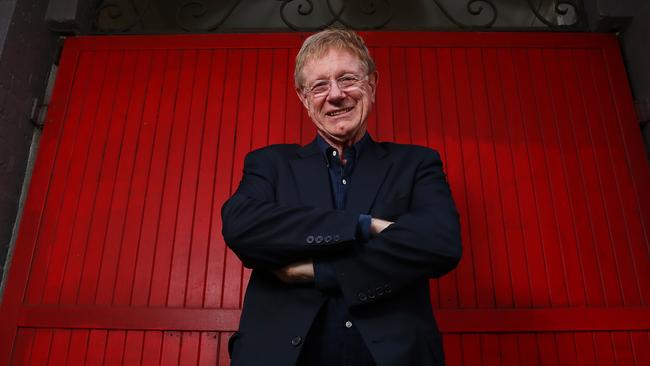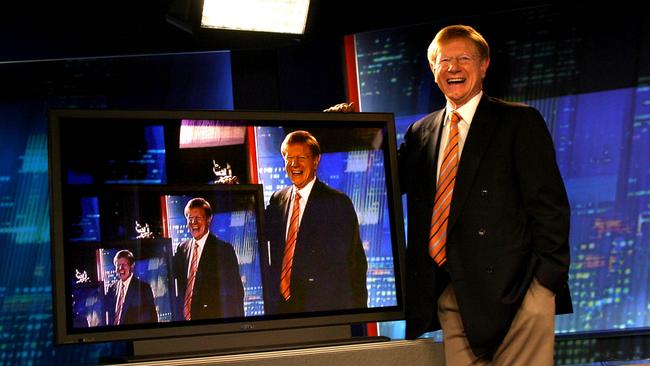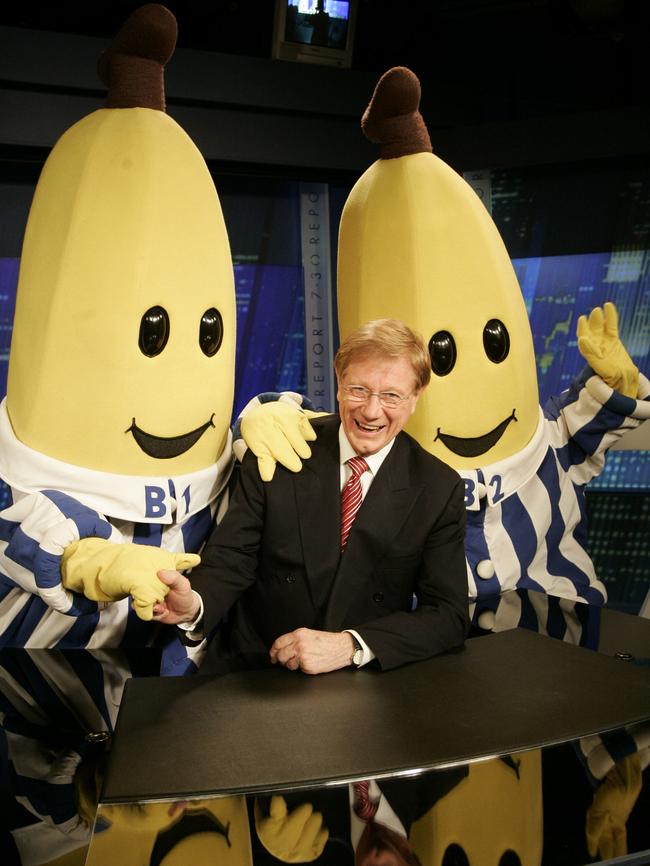Kerry O’Brien: It’s war on the ABC so fight
Kerry O’Brien doesn’t miss TV. And he doesn’t watch it so much. But he has strong words of advice for the ABC | LISTEN

Kerry O’Brien doesn’t miss television. And he doesn’t watch it particularly frequently. But that doesn’t mean he doesn’t have very strong words of advice for the ABC right now.
“I think there is a war on now; I don’t see that this latest cut can be justified,” the 72-year-old journalist tells The Australian’s Behind the Media podcast following the $84 million government budget cuts announced last week.
“The ABC has been hit and it’s been hit and it’s been hit. I lived through the Shier era. I saw it close up, I saw what was behind it. There is a mindset of punishment behind these cuts.”
Jonathan Shier had a controversial tenure running the ABC in 2000 and 2001 before clashing with the board and abruptly departing. But O’Brien, who founded Lateline in 1990, hosted with distinction The 7.30 Report from 1995 to 2010 and then Four Corners until 2015, and who won six Walkleys including the Gold, says the latest cuts are worse than bad news for the ABC.
“I think it’s an insult to the public,” he says. He describes a “very strong band of public support in Australia for public broadcasting” ever since ABC radio started back in the 1930s and an “awful lot of Australians rely on it”. “Politicians would kill to have the trust that the ABC has,” he says.
O’Brien offers a solution to current managing director Michelle Guthrie: fight. “I think that there is a huge responsibility on Michelle Guthrie to get out there and explain to Australians what it means — what it is going to mean inevitably. They have to mobilise their base. And I’m not talking about them becoming a political movement. This is about saving the fundamental nature of public broadcasting in Australia. It is about being true to its people. And I don’t mean the staff; I’m talking about the public.”
O’Brien, who is as compelling answering questions as he was asking them over the decades, says cutting more corners will weaken the ABC. He predicts tough decisions lay ahead.
“You can go on about this and you can sound like a bit of a wanker, but this is a truth. A healthy media is an absolute cornerstone of a healthy democracy. Public broadcasting, I believe, is fundamental to a healthy media. It has played a huge role over many decades contributing to a healthy culture broadly — socially but also politically. I think it’s at risk.”
For this he blames our political classes. O’Brien recalls Malcolm Turnbull approaching him at an ABC function at Parliament House years ago when he was the opposition communications spokesman. “The first words that came out of his mouth were: ‘The ABC is more important today than ever.’ Where is that mindset now? It has disappeared.”
The interview starts with me telling O’Brien that my mum misses him on 7.30. He laughs but then says: “I don’t miss it.”

“I don’t miss what became the grind of those interviews, particularly the political ones.”
He would wake up, attempt to build some energy on the morning conference call, groan inwardly at who that night’s political interview was going to be. It felt like Groundhog Day. Mostly this was due to what political interviews had become. “Now I would say it’s as bad and possibly worse. There’s no sense of freshness.”
Most politicians, O’Brien says, approach most interviews in exactly the same way. “They’re there to use them primarily as a platform. They’re there to get the quote-unquote message of the day across, what they think no matter what the question. Sometimes they might go through the veneer of appearing to respect the question and respect the audience’s right to have an answer. But very quickly it’s about the message of the day.”
The rest is a defensive wall.
He tried to head this off at the pass with long questions. “And that was primarily because I was endeavouring to anticipate the flim-flam that was going to come at the start of an answer.”
Not only does he not miss television, he is only an occasional viewer. “To be honest, because I am sick to death of that great wall of noise coming at me. I think that the 24-hour news has simply become a part of the modern reality. But it’s not something I have to engage with and I don’t. I might turn on The Drum if it really interests me and the panellists are interesting. I’ll listen if it is. If there’s no value to it, I’ll quickly move past it.”
An insomniac, O’Brien will log on at 3am and read his daily dose of domestic news and then go back to sleep. Sometimes he will watch the news on ABC and possibly 7.30, but for now he has a big distraction occupying his evenings. That is when he is writing his book. Part memoir, part history, it is about the span of history that his life has coincidentally covered.
“I was born in this five or six days between when the Japanese threw in the towel and when they formally surrendered at the end of World War II, so my life has neatly spanned the whole of the post-war period and that happens to be one of the most momentous if not the most momentous time in history.” The book will examine all that through the prism of his journalism.
Asked to identify his most challenging interviewee, O’Brien immediately nominates former prime minister John Howard. His taking over The 7.30 Report and it becoming a single national program roughly coincided with Howard’s time in office. O’Brien must have interviewed him 100 times. And liked and admired him.

“I think it became almost a sort of point of honour for him to front up on tough occasions and he had the good sense to understand that there was actually something in it for him and being seen to front up. And he became very adept at dealing with those interviews.”
But Howard and the Liberals refused to countenance O’Brien hosting the 1996 leaders debate when the Liberal leader was challenging Labor’s Paul Keating for the prime ministership. They were unhappy with how O’Brien had moderated the previous debate in 1993 between John Hewson and Paul Keating.
O’Brien says Howard wasn’t against the idea but all his advisers were. “We had some interesting conversations around that but he then went out around the electorate during the campaign and bagged me up hill and down dale. So what was said privately and what was said publicly were to some degree two different things.”
But O’Brien is critical of ABC management for trapping itself in the issue. He told them to find someone else before it became a confrontation. The ABC stuck to its guns and the debates went to Nine and Ray Martin. And the infamous worm.
O’Brien might not have been at the time, but he is sanguine now. “There’s no great professional joy in doing them anyway. They very rarely reveal much and they very rarely change the flow of an election.”
O’Brien’s education in Brisbane was “somewhat rudderless” and he worked as a public servant before stumbling into journalism doing some weekend work at Channel 9’s very small newsroom. Day one and he was hooked.
O’Brien recalls: “The sense of adrenalin, the sense of the rush, the chase, the passion that was around you from the other journalists. I’d experienced the atmospherics of all that for about 10 seconds when I realised that that was what I wanted to do with the rest of my life.”
His next move after a cadetship at Nine was a “wonderful provincial newspaper”, The Queensland Times in Ipswich, which he says was “the most fantastic grounding”, sitting in a galvanised shed in 100 degrees covering the local shows. “Typing up 400 or 500 bird and dog and other animal results. And if you made a single mistake the editor would be on your tail the next day because you could be sure that the owner of the particular budgerigar that you got wrong was going to find it and complain.”
O’Brien, who has six adult children, none of whom are journalists, left Sydney when he left The 7.30 Report. He now lives near Byron Bay on the NSW north coast with his wife, former Sydney Morning Herald journalist Sue Javes.
“I don’t miss television. I’m going to take stock when this book is wrapped up, and I’ve got some ideas for documentaries, I’ve got ideas for interviews, but whether I actually do any of them remains to be seen.”



To join the conversation, please log in. Don't have an account? Register
Join the conversation, you are commenting as Logout